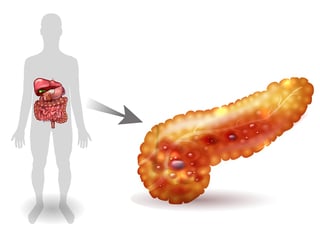
Pancreatitis is a disease in which the pancreas becomes inflamed. Pancreatic damage happens when the digestive enzymes are activated before they are released into the small intestine and begin attacking the pancreas. It can be acute or chronic.
Recent genetic studies have demonstrated the pathogenic variants in the CTRC gene markedly increase the risk of progression from RAP to CP and the primary effect appears to be in smokers. The SPINK1 N34S variant increases the risk of tropical CP 19-fold, idiopathic CP, 15-fold, and alcoholic CP, 5-fold. Homozygous and compound heterozygous mutations in CTRC [chymotrypsin C] and CASR do not appear to be sufficient to initiate recurrent acute or CP alone. These variants cluster in patients with CP who also carry variants in PRSS1 [cationic pancreatic trypsinogen], CFTR [cystic fibrosis transmembrane conductance regulator], or SPINK1 suggesting that they are disease modifiers, making mild or subclinical pancreatitis more severe. Multiple studies over the past 20 years demonstrated that smoking increased the risk for CP. Unlike alcohol, which had a threshold for effect, smoking appears to confer a dose-dependent effect. The CLDN2 risk allele T “has been associated with a significant increase in the risk of alcoholic RAP and CP,” according to study findings cited in a review article published in Therapeutic Advances in Gastroenterology.
1. True or False. Pathogenic variants of the chymotrypsin C (CTRC) gene (G60G haplotype) increase the risk of progression from recurrent acute pancreatitis (RAP) to chronic pancreatitis (CP).
A. True
B. False
2. The SPINK1 N34S variant increases the risk of idiopathic chronic pancreatitis (CP) _____-fold, according to study findings.
A. 5
B. 10
C. 15
3. True or False. A homozygous mutation of the calcium sensing receptor gene (CASR) is sufficient for chronic pancreatitis (CP) to develop.
A. True
B. False
4. The increase in risk of chronic pancreatitis (CP) with __________ is dose-dependent.
A. Alcohol
B. Smoking
C. A and B
5. True or False. According to study findings, the CLDN2 risk allele T significantly increases the risk of alcoholic chronic pancreatitis (CP).
A. True
B. False
Answer Key:
1. A. True
2. C. 15
3. B. False
4. B. Smoking
5. True
For complete information, see:
Zator Z, Whitcomb DC. Insights into the genetic risk factors for the development of pancreatic disease. Ther Adv Gastroenterol. 2017;10(3):323–336.

